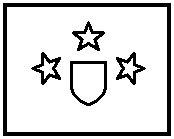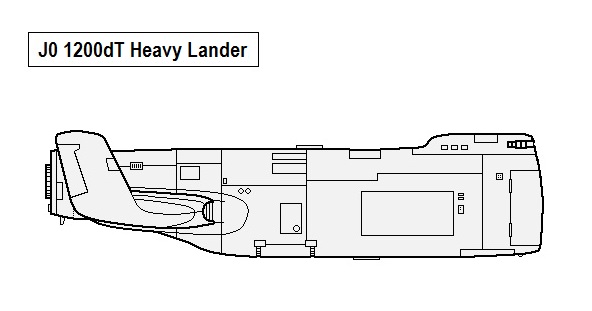Difference between revisions of "Colossus class Heavy Lander"
| Line 5: | Line 5: | ||
|architect= Ade Stewart | |architect= Ade Stewart | ||
|blueprint= No | |blueprint= No | ||
| + | |canon= No | ||
|caption = Unpublished, non-canon fan design. | |caption = Unpublished, non-canon fan design. | ||
|cargo = 900 | |cargo = 900 | ||
Revision as of 22:32, 18 March 2019
| Colossus class Heavy Lander | |
|---|---|
 Unpublished, non-canon fan design. | |
| Type: QH Auxiliary | |
| Size | 1,200 Tons |
| Hull Configuration | [[Conical Hull]] |
| Streamlining | Streamlined Hull |
| Tech Level | TL–9 |
| Engineering | |
| Computer | Model/2 |
| Jump | J-2 |
| Maneuver | 2 G |
| Armaments | |
| Hardpoints | 12 |
| Accommodations | |
| Staterooms | 0 |
| Personnel | |
| Crew | 16 |
| Officers | 4 |
| Enlisted | 12 |
| High/Mid Passengers | 0 |
| Payload | |
| Cargo | 900 Tons |
| Fuel tank | 0 Tons |
| Construction | |
| Origin | Distant Fringe |
| Year Operational | No information yet available. |
| Price | |
| Cost | MCr425.113 (base) MCr340.091 (qty) |
| Architect fee | MCrAde Stewart |
| Statistics | |
| Quick Ship Profile | QH-MS20 |
| Images | |
| Blueprint | No |
| Source | |
| Also see | Spaceplane |
| Canon | Published, non-canon design |
| Reference | Ade Alagoric Stewart |
| Starships are designed with the Classic Traveller format, using Book 5 High Guard | |
The Colossus class Heavy Lander is a Transport spacecraft.
- It is a Civilian Ship and an Auxiliary Spaceplane.
- Please also see AAB article: Ships of the Distant Fringe.
Description (Specifications)
The Heavy Lander is designed to ferry cargo and fuel between a world's surface and close orbit. It is a common in-system transport vessel within the Distant Fringe and is occasionally carried as a subcraft aboard large commercial vessels. Similar designs have been in use from the time the Distant Fringe was first settled.
- The vessel is a TL-9 design.
Image Repository

A Colossus class Heavy Lander.
Basic Ship Characteristics
Following the Imperial Navy and IISS Universal Ship Profile and data, additional information is presented in the format shown here. The small craft factor indicates the number of squadrons (of ten craft) carried on the ship. Tonnage on the universal ship profile is shown in kilotons (thousands of tons) where necessary. [1]
| No. | Category | Remarks |
|---|---|---|
| 1. | Tonnage | The Heavy Lander is constructed using a 1,200 dTon hull built in a generally cone-shaped configuration. The hull is fully streamlined, giving good atmospheric performance that is further enhanced by its onboard gravitic systems.
|
| 2. | Crew | Total Crew Complement: 16
Accommodations There are 15 Staterooms.
There are 20 Low Berths. Accessible areas of the hull are fitted with grav plates and inertial compensators and have full life support and environmental systems.
|
| 3. | Performance | The vessel mounts a Maneuver-2 drive and a Power Plant-2, giving performance of 2-G acceleration and producing 24 Energy Points. The ship has an agility rating of 2. The internal fuel tankage gives the power plant 4 weeks duration.
|
| 4. | Electronics | Adjacent to the bridge is a Model/2 Computer: the vessel has a backup Model/2 Computer.
|
| 5. | Hardpoints | x10 hardpoints.
|
| 6. | Armament | The Heavy Lander is generally unarmed. |
| 7. | Defenses | The hull is unarmored.
x10 triple Sandcaster turrets, grouped into one battery of 10 linked turrets
|
| 8. | Craft | The vessel carries no subcraft. |
| 9. | Fuel Treatment | The vessel has internal fuel tankage of 240 dTons.
|
| 10. | Cost | The basic cost of the vessel is MCr425.113.
|
| 11. | Construction Time | 125 weeks (31 months) as standard.
|
| 12. | Comments | Standard cargo capacity amounts to 900 dTons.
|
History & Background (Dossier)
A large interface craft primarily designed to shuttle fuel, cargo and sundries between a worlds surface and close orbit. It is frequently used as an in-system transport, carrying equipment and supplies to secondary worlds within a system. The design is representative and a large number of variants exist, particularly with regard to the allotted weapons systems, onboard electronics, and the fit out of internal spaces.
Distant Fringe Vessels
The Distant Fringe is said to be a far spinward-rimward area inhabited by colonists and refugees originating on Terra. The region is extremely isolated, separated from the rest of Charted Space by vast, almost uncrossable rifts that were once broached by a system of calibration Points and the use of tankers. Those few academics within Charted Space who have found references to the Distant Fringe regard it as little more than a tall tale. Likewise, many of the inhabitants of the Distant Fringe believe the existence of Charted Space to be mythical.[3]
Vessels originating within the Distant Fringe are very rarely encountered outside of the region. However, misjumps do occur and anomalies with bizarre spacetime and Jumpspace effects exist: as such, craft of this type are not entirely unknown within Charted Space.[4]
Class Naming Practice/s & Peculiarities
Different examples of the design are known by many different names but all have very similar performance characteristics and capabilities.
Selected Variant Types & Classes
References & Contributors (Sources)
| This article has metadata. |
| This article is missing content for one or more detailed sections. Additional details are required to complete the article. You can help the Traveller Wiki by expanding it. |
- Marc Miller, Frank Chadwick, John Harshman. High Guard (Game Designers Workshop, 1980), 20-37. (Design Sequence Used)
- Traveller Wiki Editorial Team
- Author & Contributor: Lord (Marquis) and Master Scout Emeritus Adie Alegoric Stewart of the IISS
- Author & Contributor: Lord (Marquis) and Master of Sophontology Maksim-Smelchak of the Ministry of Science
- ↑ Timothy B. Brown. Fighting Ships (Game Designers Workshop, 1981), 10.
- ↑ Timothy B. Brown. Fighting Ships (Game Designers Workshop, 1981), 10.
- ↑ Information provided to the library by Maksim-Smelchak
- ↑ Information provided to the library by Maksim-Smelchak